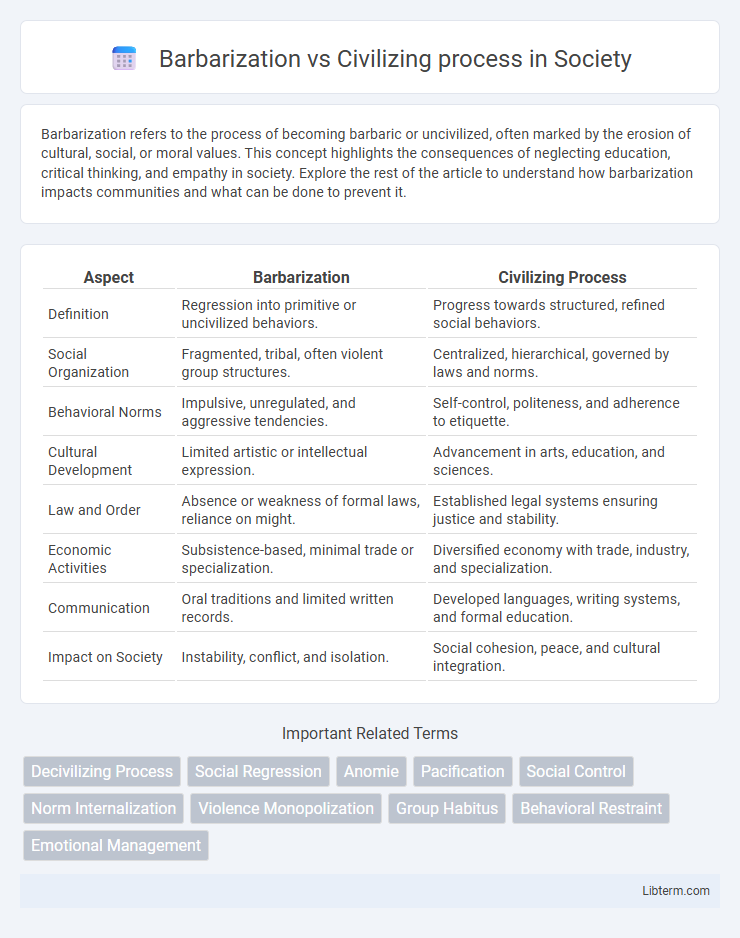Barbarization refers to the process of becoming barbaric or uncivilized, often marked by the erosion of cultural, social, or moral values. This concept highlights the consequences of neglecting education, critical thinking, and empathy in society. Explore the rest of the article to understand how barbarization impacts communities and what can be done to prevent it.
Table of Comparison
| Aspect | Barbarization | Civilizing Process |
|---|---|---|
| Definition | Regression into primitive or uncivilized behaviors. | Progress towards structured, refined social behaviors. |
| Social Organization | Fragmented, tribal, often violent group structures. | Centralized, hierarchical, governed by laws and norms. |
| Behavioral Norms | Impulsive, unregulated, and aggressive tendencies. | Self-control, politeness, and adherence to etiquette. |
| Cultural Development | Limited artistic or intellectual expression. | Advancement in arts, education, and sciences. |
| Law and Order | Absence or weakness of formal laws, reliance on might. | Established legal systems ensuring justice and stability. |
| Economic Activities | Subsistence-based, minimal trade or specialization. | Diversified economy with trade, industry, and specialization. |
| Communication | Oral traditions and limited written records. | Developed languages, writing systems, and formal education. |
| Impact on Society | Instability, conflict, and isolation. | Social cohesion, peace, and cultural integration. |
Introduction to Barbarization and Civilizing Process
The barbarization process refers to the deterioration of social structures, characterized by increased violence, social fragmentation, and the decline of cultural norms. In contrast, the civilizing process involves the gradual development of social order, refinement of behavior, and establishment of legal institutions. These concepts, originating from Norbert Elias's sociological theory, highlight the dynamic tension between societal regression and progress.
Defining Barbarization: Key Concepts
Barbarization refers to the process by which societies or individuals adopt behaviors, practices, or social structures perceived as primitive, violent, or disorderly, often marked by the erosion of cultural norms and civilized order. Key concepts include social decay, moral decline, and the breakdown of institutions that uphold law, education, and cultural refinement. This contrasts with the civilizing process, which involves the gradual development of self-control, social manners, and complex institutions fostering cooperation and stability.
The Civilizing Process: An Overview
The Civilizing Process, as articulated by sociologist Norbert Elias, examines the historical development of social norms, manners, and state formation from medieval barbarism to modern civility. It emphasizes the gradual internalization of self-restraint and the regulation of human behavior through complex social interdependencies and the monopolization of violence by centralized authorities. This process reveals how evolving power structures and cultural standards shape societies toward increased social order and refined interpersonal conduct.
Historical Contexts: From Barbarism to Civilization
The historical contexts of barbarization versus the civilizing process highlight the transformation of societies from perceived primitiveness to structured governance and cultural development. Civilizing processes often involved the establishment of legal systems, urbanization, and social hierarchies, as seen in Ancient Mesopotamia, Classical Greece, and the Roman Empire. Contrastingly, periods of barbarization, such as the Migration Period in Europe, are marked by social fragmentation, loss of centralized control, and cultural regression.
Theorists and Thinkers: Elias and Beyond
Norbert Elias' concept of the Civilizing Process explores the transformation of social behaviors through increasing self-restraint and structured societal norms, distinguishing it from barbarization characterized by social disintegration and violence. Elias emphasizes the role of state formation and monopolization of legitimate violence in fostering civility and psychological regulation among individuals. Later theorists expand on Elias by analyzing contemporary manifestations of barbarization in modern societies, integrating insights from sociology, anthropology, and political theory to examine the balance between social order and regression.
Mechanisms of Societal Change
Mechanisms of societal change in barbarization involve increased social conflict, breakdown of institutions, and cultural fragmentation leading to diminished social cohesion. Civilizing processes promote the development of stable institutions, enhanced social norms, and increased cooperation through mechanisms like state formation, legal systems, and economic interdependence. Both processes reflect dynamic transformations influenced by shifts in power structures, resource distribution, and collective identity within societies.
Indicators of Barbarization in Modern Times
Indicators of barbarization in modern times include the rise of political violence, erosion of social norms, and widespread human rights abuses. Increased intolerance, dehumanization of opposing groups, and breakdowns in institutional trust signify a regression from civilizing processes. These trends manifest in growing conflicts, societal fragmentation, and the normalization of aggression.
Civilizing Forces in Contemporary Societies
Civilizing forces in contemporary societies manifest through the advancement of education, legal frameworks, and social norms that promote stability, cooperation, and human rights. These forces are reflected in the institutionalization of democratic governance, the enforcement of rule of law, and the cultivation of cultural values that prioritize tolerance and inclusivity. The interplay of technological innovation and globalization further reinforces civilizing processes by facilitating communication, economic development, and cross-cultural understanding.
Case Studies: Examples of Both Processes
The barbarization process is exemplified by the Mongol invasions, where the destruction of cities and disruption of social structures led to cultural regression and chaos. Conversely, the civilizing process is illustrated by the European Renaissance, marked by advancements in arts, sciences, and social institutions that fostered cultural refinement and stability. These case studies highlight contrasting trajectories of societal development through conquest and cultural flourishing.
Conclusion: Implications for Future Social Development
The interplay between barbarization and the civilizing process reveals critical insights into societal evolution, highlighting the tension between social regression and progressive order. Understanding these dynamics aids in predicting patterns of cultural integration, social cohesion, and conflict resolution. Future social development depends on balancing these forces to foster sustainable growth, institutional stability, and inclusive societal norms.
Barbarization Infographic

 libterm.com
libterm.com